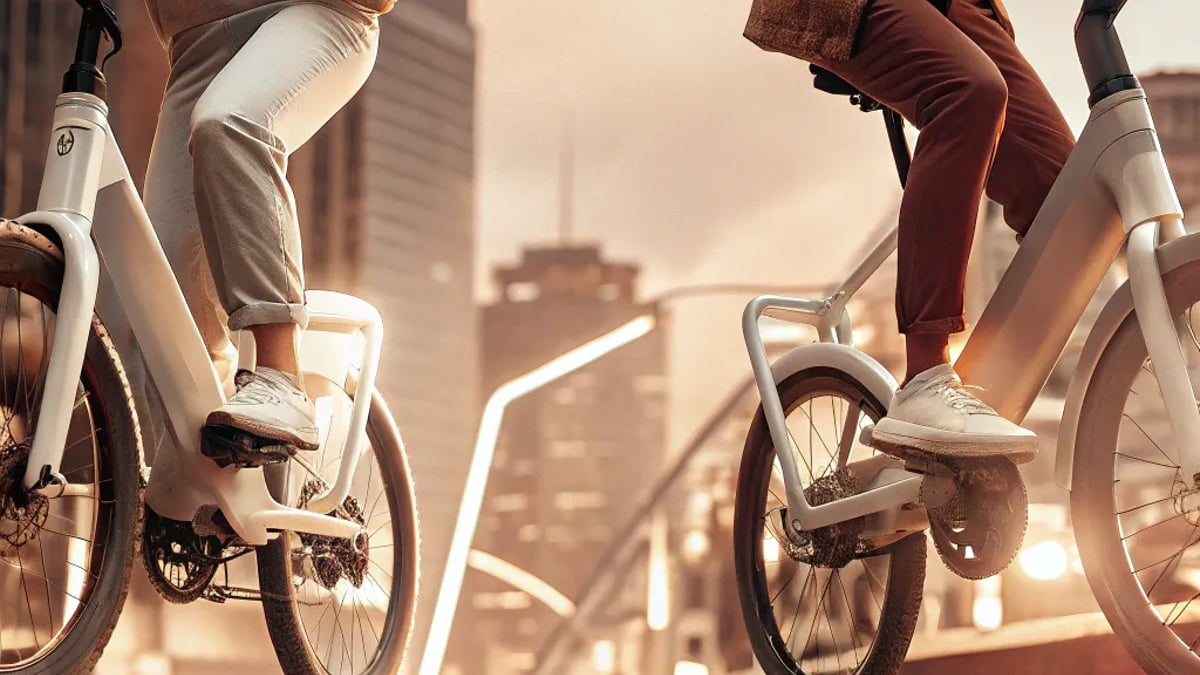
Smart bikes have evolved dramatically in recent years, transforming from novelty gadgets into sophisticated training tools and transportation options. As we roll into 2025, the integration of cutting-edge technology with traditional cycling has created a new generation of two-wheeled wonders that offer unprecedented connectivity, performance tracking, and riding experiences.
The Smart Bike Revolution: What's Changed in 2025
Remember when a bike computer that showed your speed and distance was considered high-tech? Those days are firmly behind us. Today's smart bikes incorporate everything from AI-powered coaching to integrated navigation systems that make your ride safer and more efficient.
"The adoption of smart bike technology has increased by 47% since 2023," notes cycling analyst Meredith Chen from CycleTrack Research. "What we're seeing isn't just gadgetry—it's practical technology that enhances the riding experience in meaningful ways."
This year's models have made significant leaps in several areas:

- Battery life extensions that now support multi-day tours without recharging
- Lighter-weight frames despite added technology
- More intuitive user interfaces requiring minimal setup
- Improved integration with fitness platforms and riding apps
- Advanced security features including GPS tracking and biometric locks
The latest smart bikes also address one of the biggest complaints from early adopters: maintenance complexity. Many 2025 models feature self-diagnostic systems that alert riders to potential issues before they become problems.
Top Smart Road Bikes of 2025
1. Specialized Turbo Connect SL
The Specialized Turbo Connect SL represents the pinnacle of road smart bike engineering. At just 18.5 pounds (for the medium frame), it's remarkably light for a bike packed with technology.
What makes it stand out is its adaptive resistance system. Using topographical data and rider metrics, the bike automatically adjusts resistance to simulate real-world conditions even when you're riding on flat terrain. This means you can experience the challenge of climbing the Alps while cruising through suburban streets.
The integrated heads-up display projects essential information onto a small transparent screen in your line of sight, eliminating the need to look down at a handlebar-mounted computer. Battery life extends to approximately 22 hours of active riding.
John Mercer, a cycling coach from Portland, told me, "The predictive power metrics on the Turbo Connect have transformed how I train my clients. It's like having a sports lab strapped to your bike."
Price: $4,299
2. Trek Domane+ SLR
Trek's flagship smart road bike merges traditional road bike aesthetics with cutting-edge tech. The Domane+ SLR houses its technology within the frame tubes, maintaining clean lines while providing robust functionality.
Its standout feature is the IsoSpeed decoupler system, which now adapts automatically based on road conditions detected by integrated sensors. The bike's AI system learns your riding style over time and can suggest form improvements through subtle haptic feedback in the handlebars.
The companion app offers detailed ride analysis, including a "replay" feature that lets you visualize your ride afterward with performance metrics overlaid on video captured by the front-facing camera.
Price: $4,799
3. Cannondale SystemSix Neural
Cannondale's aero smart bike focuses on performance optimization above all else. The SystemSix Neural continuously analyzes your position, pedaling efficiency, and power output to provide real-time coaching through bone-conduction audio built into the helmet integration system.
The bike's "Draft Assist" feature is particularly innovative—it uses rear sensors to detect other riders and provides guidance on optimal drafting positions, helping you conserve energy during group rides.
While not the lightest option (21.3 pounds), its aerodynamic design and smart features make it a favorite among data-obsessed riders looking to maximize performance.
Price: $5,200
Best Smart Mountain Bikes
1. Santa Cruz Tallboy Synapse
Santa Cruz has transformed their popular Tallboy into a technological marvel with the Synapse edition. This smart trail bike features an electronic suspension system that adjusts compression and rebound settings 200 times per second based on terrain analysis.
The bike's "Trail Memory" function is particularly impressive—it records detailed information about trails you ride, including optimal suspension settings, gear selections, and line choices. When you return to the same trail, the bike provides subtle guidance to help you improve your performance.
"I was skeptical about smart MTBs until I rode the Tallboy Synapse," says professional mountain biker Ellie Martinez. "The suspension adaptation is so smooth you don't notice it happening, but you definitely feel the difference in control."
The integrated lighting system automatically adjusts brightness based on ambient conditions and trail difficulty, a welcome safety feature for riders who find themselves out later than planned.
Price: $6,499
2. Yeti SB150 Cognitive
Yeti's entry into the smart bike market stays true to the brand's performance-first philosophy. The SB150 Cognitive uses machine learning to optimize its Switch Infinity suspension system for different riders and terrain types.
What sets this bike apart is its predictive shifting—analyzing the trail ahead using forward-facing sensors and automatically preparing the optimal gear ratio before you reach challenging sections. This feature can be disabled for purists, but many riders find it enhances the flow of technical descents.
The bike also includes an emergency response system that can detect crashes and send location data to emergency contacts if needed—a potentially life-saving feature for those who ride remote trails alone.
Price: $7,200
Smart Indoor Training Bikes
1. Wahoo KICKR Bike Studio
Indoor training has been revolutionized by smart bikes, and the Wahoo KICKR Bike Studio leads the pack in 2025. This stationary smart bike offers unprecedented realism with its ability to simulate gradients from -15% to +30% by physically tilting the entire bike.
The KICKR Bike Studio's "RealRoad" feature uses machine learning to replicate the feel of different road surfaces, from smooth tarmac to cobblestones, by adjusting the electromagnetic resistance system thousands of times per second.
Integration with virtual riding platforms is seamless, but Wahoo's own training ecosystem has become increasingly popular due to its AI coach that develops personalized training plans based on your performance data and goals.
"For serious cyclists who train indoors regularly, the KICKR Bike Studio is worth every penny," notes cycling coach Theresa Williams. "The physical adjustments it makes to simulate real-world conditions create muscle memory that translates directly to outdoor riding."
Price: $3,999
2. Peloton Apex
Peloton continues to dominate the connected fitness space with their Apex smart bike. While primarily designed for indoor use, the 2025 model offers a "hybrid mode" that lets you detach it from its base and use it as a traditional road bike with smart features intact.
The Apex stands out for its content ecosystem, which now includes AR-enhanced scenic rides where digital elements are overlaid on real-world routes. The social features remain industry-leading, with the ability to virtually ride with friends regardless of location.
Battery life when used in outdoor mode is somewhat limited at 8 hours, but the quick-charge feature provides 2 hours of ride time from just 15 minutes of charging.
Price: $2,499 (plus subscription)
How Do You Choose the Right Smart Bike?
Selecting the perfect smart bike depends largely on your primary riding goals. Here's a quick breakdown to help guide your decision:
- For road performance: Focus on bikes with advanced metrics, aerodynamic features, and long battery life
- For trail riding: Prioritize smart suspension systems and safety features
- For commuting: Look for integration with navigation, traffic alerts, and security features
- For indoor training: Consider the virtual platforms the bike works with and the realism of the riding experience
"The best smart bike is the one that enhances the type of riding you already love," says Alex Nguyen, editor at Cycling Technology Review. "Don't get distracted by features you'll never use—focus on technology that solves your specific pain points."
What About Converting Your Existing Bike?
Not ready to invest in a complete smart bike? Several conversion kits have hit the market in 2025 that can transform your traditional bike into a connected ride:
Upgrade Options
- SRAM AXS Smart System - Adds electronic shifting, power metering, and basic metrics
- Garmin Edge Ecosystem - Provides comprehensive performance tracking and navigation
- SpeedX Conversion Kit - Offers a complete smart cockpit replacement with integrated display
These options typically range from $800-$2,000 depending on the level of functionality, significantly less than a complete smart bike.
Are Smart Bikes Worth the Investment?
The question of value inevitably comes up when discussing technology that adds thousands to the price of a bicycle. For many dedicated cyclists, the answer is increasingly "yes."
Lisa Montgomery, who completed the Great Divide Mountain Bike Route last summer using a smart mountain bike, shared her perspective: "Having navigation, emergency features, and adaptive suspension made tackling such a challenging route much more accessible. I felt more confident riding solo knowing I had these systems backing me up."
For competitive cyclists, the training insights provided by smart bikes can replace expensive coaching services. Urban commuters benefit from safety features and theft protection. And for indoor training, the immersive experience keeps riders motivated through winter months.
What About Privacy Concerns?
As with any connected technology, smart bikes raise questions about data privacy. Most manufacturers collect riding data, which they use to improve their products and services.
The League of American Bicyclists has recently published guidelines for smart bike data privacy, recommending that consumers look for brands that:
- Clearly disclose what data is collected
- Provide options to limit data sharing
- Allow users to delete historical data
- Protect ride location information
"Always read the privacy policy before connecting your smart bike to its companion app," advises consumer technology expert Marcus Lee. "Some brands are much more aggressive about data collection than others."
The Future of Smart Bikes
Looking beyond 2025, several emerging technologies are likely to further transform the smart bike landscape:
- Solar integration - Frames with photovoltaic coatings to extend battery life
- Advanced materials - Carbon nanotube composites that can change rigidity on demand
- Expanded biometric tracking - Hydration monitoring and advanced fatigue detection
- Vehicle-to-infrastructure communication - Bikes that communicate with smart traffic systems
Industry analysts predict the smart bike market will continue growing at approximately 12% annually through 2030, with the most significant growth in urban commuter models as cities worldwide expand cycling infrastructure.
Common Questions About Smart Bikes
How long do smart bike batteries typically last?
Battery life varies significantly between models and depends heavily on which features you're using. Most 2025 road smart bikes offer 15-25 hours of ride time with basic features enabled. Using power-hungry features like radar, lights, and video recording can reduce this by 30-50%.
Most models use removable batteries, allowing you to carry a spare for longer rides. Quick-charge technology has also improved, with many bikes able to gain 5-7 hours of use from a 30-minute charge.
Can smart bikes be ridden when the battery dies?
Yes, all quality smart bikes are designed to function as traditional bikes when their batteries are depleted. However, you'll lose electronic shifting, smart suspension adjustments, and obviously all display and connectivity features.
Some models maintain critical safety features like lights on a separate backup battery that provides an additional 2-3 hours of operation after the main battery is depleted.
Are smart bikes significantly heavier than traditional bikes?
The weight difference has narrowed considerably in recent years. Early smart bikes often carried a 3-5 pound penalty, but 2025 models typically add just 1-3 pounds compared to their traditional counterparts. High-end models like the Specialized Turbo Connect SL have nearly eliminated the weight difference through integration of components and advanced materials.
Disclaimer
This article is for informational purposes only and does not constitute professional advice on bicycle selection or fitness training. Always consult with a certified bike fitter before making significant investments in cycling equipment. The technology described may have health implications for certain individuals, particularly features related to training intensity and performance metrics. Consult with a healthcare provider before beginning any new exercise program.
Smart bike technology continues to evolve rapidly, and while we've made every effort to provide accurate information, specifications and features may change. Always check manufacturer websites for the most current details before making purchase decisions.
Tags

About Evelyn Grant the Author
Evelyn Grant is a trailblazer in the world of cycling fashion, known for combining functionality with style. With over a decade of experience, she designs apparel that meets the demands of avid cyclists while making a bold fashion statement.
Recommended Articles
Retirees Reveal 6 Grocery Habits That Save Big
Discover six grocery habits retirees use to save money and eat healthier. Learn practical tips for budget-friendly shopping.
Explore the Benefits of Police Seized Watches in This Comprehensive Article
Discover the unique benefits of purchasing police-seized watches, from cost savings to potential investment opportunities. Enjoy exploring a new luxury watch market.
New Year, New Rates: See What Affects Your 2026 Benefits
Discover how new rates in 2026 will affect your benefits, from COLA adjustments to health insurance changes. Stay informed to manage your finances.
2025 BMW X3 Raises the Bar for Compact Luxury Crossovers
Discover the 2025 BMW X3, a compact luxury crossover that combines performance, design, and advanced technology to set a new standard in its class.
2025 Hyundai Ioniq 6 Is the Sleek Electric Sedan of the Future
Discover the 2025 Hyundai Ioniq 6, an electric sedan with sleek design, advanced technology, and impressive range for modern drivers.




